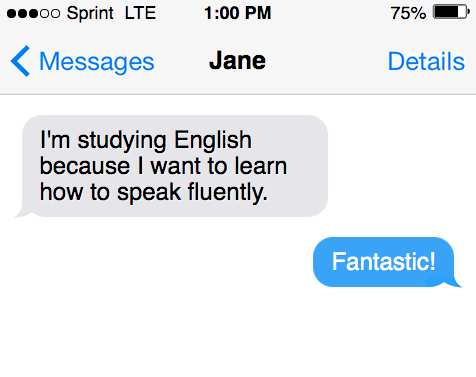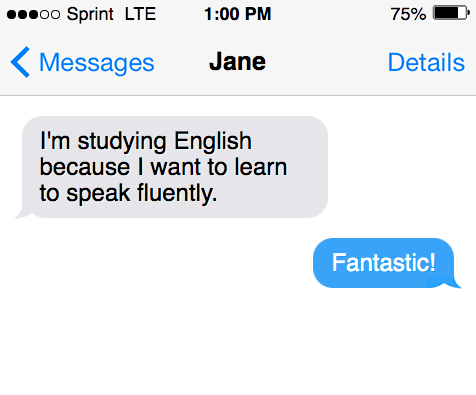Is “because” a conjunction? What is a conjunction and a subordinating conjunction? Does a comma need to come after the word “because?”
Get answers to this English language grammar question in this short guide…
Is the word “because” a conjunction?
No, “because” is not a conjunction. It is what is called a subordinating conjunction. Subordinating conjunctions are words that join a subordinate clause to the main clause.
The most common subordinating conjunction in English is because.
Other subordinating conjunctions include after, before, since, when, while, until, although, and though.
Subordinating conjunctions examples
- “I’m studying English because I want to learn how to speak fluently.”
- “After I finish my degree, I’m going to travel the world.”
Before studying conjunctions, make sure you know what a subordinate clause is.
A subordinate clause is a group of words with both a subject and a verb but cannot stand alone as a sentence. It must be attached to the main clause.
For example:
- “I’m studying English because I want to learn how to speak fluently.
“Because I want to learn how to speak fluently” is a subordinate clause.
It cannot stand alone as a sentence because it is missing a subject. In this example, the subject is “I,” and the verb is “want.”
“I want to learn how to speak fluently” is the main clause. It can stand alone as a sentence because it has a subject and a verb.

What is the difference between a coordinating conjunction and a subordinating conjunction?
The main difference between coordinating conjunctions and subordinating conjunctions is that coordinating conjunctions join two independent clauses while subordinating conjunctions join a subordinate clause to an independent clause.
Let’s look at some examples:
Coordinating conjunction examples
- “I’m studying English and French.”
- “But I don’t like learning grammar rules.”
- “Or maybe I do like learning grammar rules.”
- “So studying conjunctions might not be so bad.”
In these examples, the coordinating conjunction joins two independent clauses. The first independent clause is “I’m studying English,” and the second independent clause is “I don’t like learning grammar rules.”
The second independent clause could also be, “Or maybe I do like learning grammar rules.”
Subordinating conjunction examples
- “I’m studying English because I want to learn how to speak fluently.”
- “After I finish my degree, I’m going to travel the world.”
Before studying conjunctions, make sure you know what a subordinate clause is.
In these examples, the subordinating conjunction joins a subordinate clause with an independent clause.
The subordinate clause is “because I want to learn how to speak fluently.” The independent clause is “I’m studying English.”
The second example is similar. The subordinate clause is “after I finish my degree,” and the independent clause is “I’m going to travel the world.”

What are some common conjunctions in English?
The most common conjunctions in English are and, or, and but. Other common conjunctions include because, since, so, after, before, while, until, although, and though.
Does a comma need to come before the word “because” in a subordinating conjunction?
No, a comma does not need to come before the word “because” in a subordinating conjunction.
However, if the subordinate clause comes before the independent clause, a comma is used to separate the two clauses.
For example:
- “Because I want to learn to speak fluently, I’m studying English.”
In this example, the subordinate clause is “because I want to learn to speak fluently,” and the independent clause is “I’m studying English.” The subordinate clause comes before the independent clause, so a comma is used to separate the two clauses.
No comma is needed if the independent clause comes before the subordinate clause.
For example:
- “I’m studying science because I want to learn the universe’s mechanics.”
In this example, the independent clause is “I’m studying English,” and the subordinate clause is “because I want to learn to speak fluently.”
The independent clause comes before the subordinate clause, so no comma is needed.
Is the word “because” a conjunction or preposition?
The word “because” can be used as a conjunction or preposition. When it is used as a conjunction, it joins two clauses together. When it is used as a preposition, it introduces a subordinate clause.
For example:
- “I’m studying English because I want to learn to speak fluently.”
In this example, the word “because” is used as a conjunction. It joins the independent clause “I’m studying English” with the subordinate clause “I want to learn to speak fluently.”
Another example:
- “The reason I’m studying English is because I want to learn to speak fluently.”
The word “because” is used as a preposition in this example. The subordinate clause is “I want to learn to speak fluently.” The subordinate clause follows the independent clause, “The reason I’m studying English.”
Is the word “because” a connective?
The word “because” can be used as a connective. A connective is a word that joins two clauses together. When “because” is used as a connective, it joins an independent clause with a subordinate clause.
For example:
- “I’m studying Math because I want to learn to add and subtract fluently.”
Sources
- Prepositions – Grammar – Academic Guides at Walden University
- Subordinate Clause: Simple Rules You Need to Know
- Main Clauses and How to Connect them – Valencia College
- Independent and Dependent Clauses // Purdue Writing Lab
- Subordinating Conjunction: Definition and Examples
- Independent and Dependent Clauses | NMU Writing Center
Inside this article
Fact checked:
Content is rigorously reviewed by a team of qualified and experienced fact checkers. Fact checkers review articles for factual accuracy, relevance, and timeliness. Learn more.
Core lessons
Glossary
- Abstract Noun
- Accusative Case
- Anecdote
- Antonym
- Active Sentence
- Adverb
- Adjective
- Allegory
- Alliteration
- Adjective Clause
- Adjective Phrase
- Ampersand
- Anastrophe
- Adverbial Clause
- Appositive Phrase
- Clause
- Compound Adjective
- Complex Sentence
- Compound Words
- Compound Predicate
- Common Noun
- Comparative Adjective
- Comparative and Superlative
- Compound Noun
- Compound Subject
- Compound Sentence
- Copular Verb
- Collective Noun
- Colloquialism
- Conciseness
- Consonance
- Conditional
- Concrete Noun
- Conjunction
- Conjugation
- Conditional Sentence
- Comma Splice
- Correlative Conjunction
- Coordinating Conjunction
- Coordinate Adjective
- Cumulative Adjective
- Dative Case
- Determiner
- Declarative Sentence
- Declarative Statement
- Direct Object Pronoun
- Direct Object
- Diction
- Diphthong
- Dangling Modifier
- Demonstrative Pronoun
- Demonstrative Adjective
- Direct Characterization
- Definite Article
- Doublespeak
- False Dilemma Fallacy
- Future Perfect Progressive
- Future Simple
- Future Perfect Continuous
- Future Perfect
- First Conditional
- Irregular Adjective
- Irregular Verb
- Imperative Sentence
- Indefinite Article
- Intransitive Verb
- Introductory Phrase
- Indefinite Pronoun
- Indirect Characterization
- Interrogative Sentence
- Intensive Pronoun
- Inanimate Object
- Indefinite Tense
- Infinitive Phrase
- Interjection
- Intensifier
- Infinitive
- Indicative Mood
- Participle
- Parallelism
- Prepositional Phrase
- Past Simple Tense
- Past Continuous Tense
- Past Perfect Tense
- Past Progressive Tense
- Present Simple Tense
- Present Perfect Tense
- Personal Pronoun
- Personification
- Persuasive Writing
- Parallel Structure
- Phrasal Verb
- Predicate Adjective
- Predicate Nominative
- Phonetic Language
- Plural Noun
- Punctuation
- Punctuation Marks
- Preposition
- Preposition of Place
- Parts of Speech
- Possessive Adjective
- Possessive Determiner
- Possessive Case
- Possessive Noun
- Proper Adjective
- Proper Noun
- Present Participle
- Prefix
- Predicate



